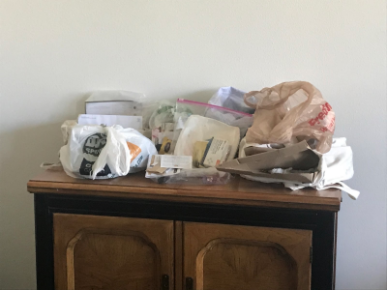
A week spent engaging, educating, and challenging students, Southern Oregon University’s Ecology and Sustainability Resource Center (ECOS) wrapped up their Zero Waste Week on Friday during a reveal of how much waste each participant produced that week. “It’s all mainly about awareness and education,” explained Kayla Bondoc, the At-large Member who coordinated this event. “I thought it would be cool to do a whole week filled with fun stuff that gets same point across as that positions before mine did.”
Zero Waste Week featured a series of eco-friendly activities and discussions. It began with the Waste Collecting Challenge: from Monday, Jan. 9 to Friday, Feb. 2, ECOS challenged students, faculty, and staff to carry every single piece of waste they produced. The participants placed every waste product other than food into a bag they carried with them everywhere. During the weigh-in and wrap-up on Friday, none of the fourteen participants produced enough waste to weigh over a pound.
“We’re not necessarily rewarding people for more or less waste, but this challenge was about getting people to participate and to start to be more aware of what kinds of things you throw away and how much you throw away to help you start avoiding waste,” explained Roxane Beigel-Coryell the Sustainability and Recycling Coordinator and Co-Chair of the SOU Sustainability Council.
Besides the Waste Collecting Challenge, ECOS also partnered with the Women’s Resource Center (WRC) in a clothing swap to promote swapping old clothes rather than buying from large companies. ECOS promoted a discussion on how to eat right without producing too much waste while on a budget, as well as hosted film screening of The Clean Bin Project.
During the Zero Waste Week wrap-up, 14 participants discussed the purpose of the past week’s activities and what everyone took away from participating in the activities. Alec Bayarsky said, “You’re always throwing away things without thinking about it, so forcing yourself to be in charge of your waste and carrying it around for the week, it will hopefully make a change in the disconnect in stopping the waste before you throw it away.”
According to participant Luis Berrios-hayden, the largest take away was that waste does not go away after throwing it in a bin. Barrios-Hayden explained “I see this bag of garbage that I’m producing it’s making me more mindful of the thing that I’m using It’s not going away, it’s not just going to disappear. It’s still here.”



